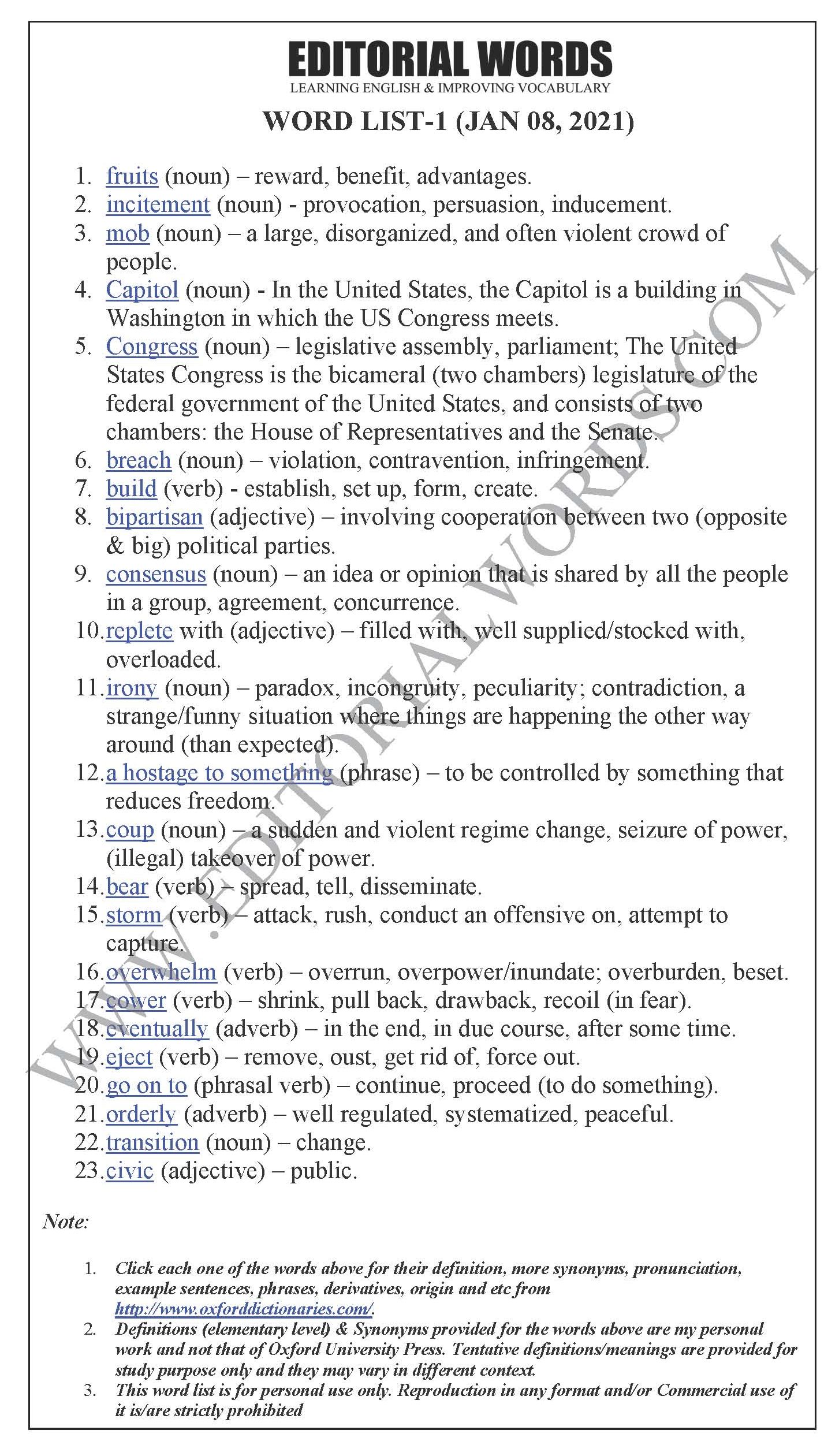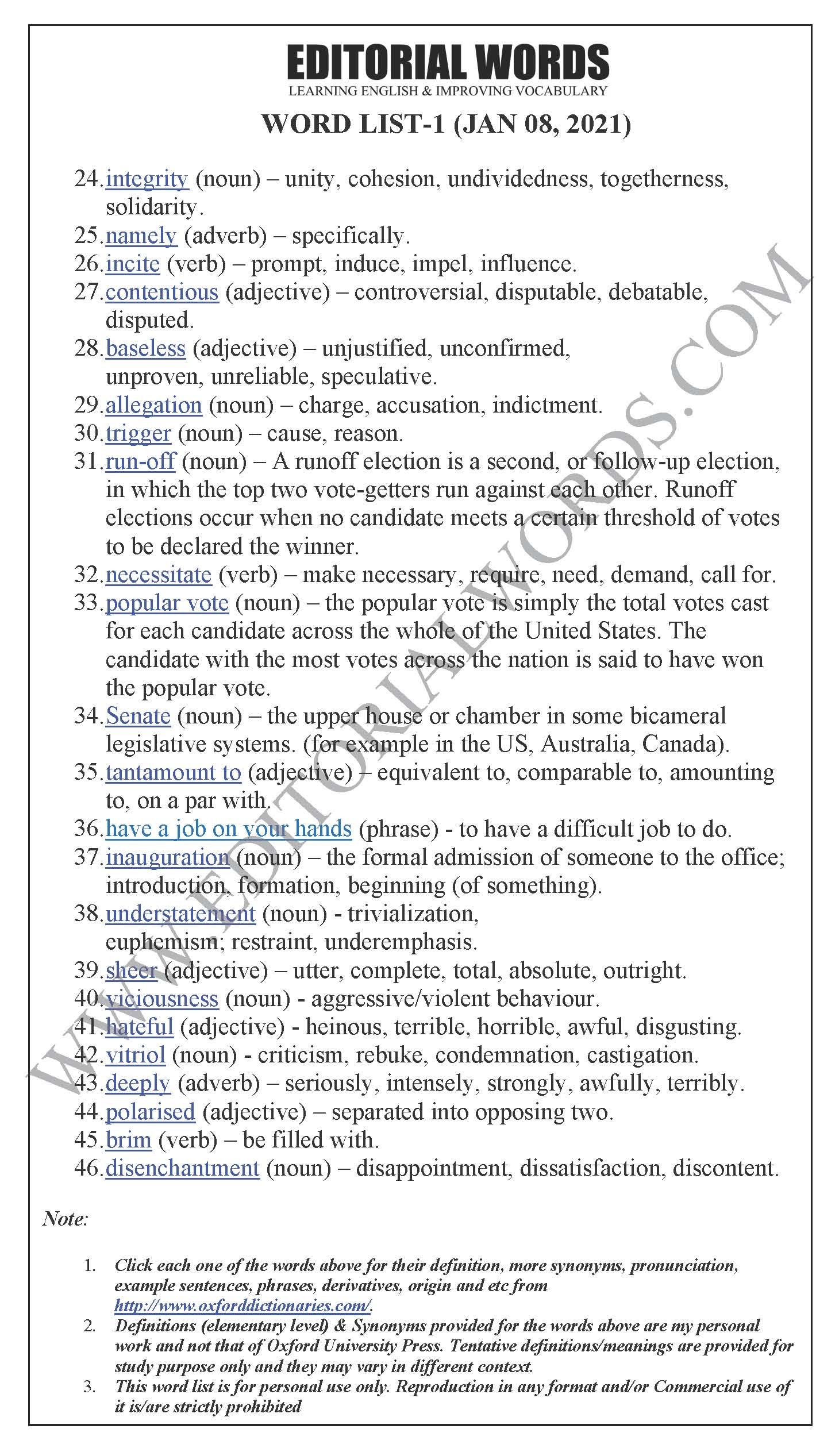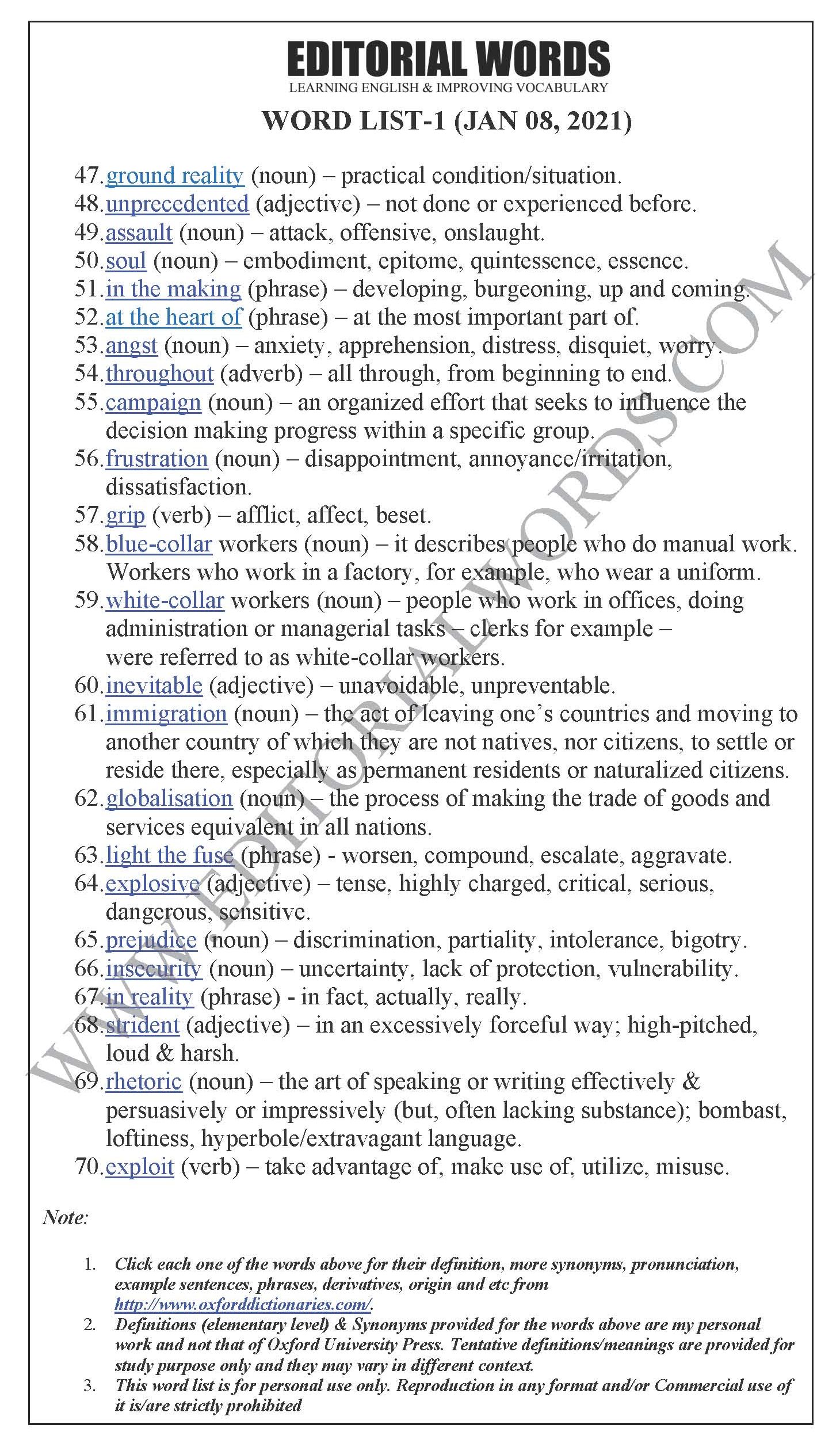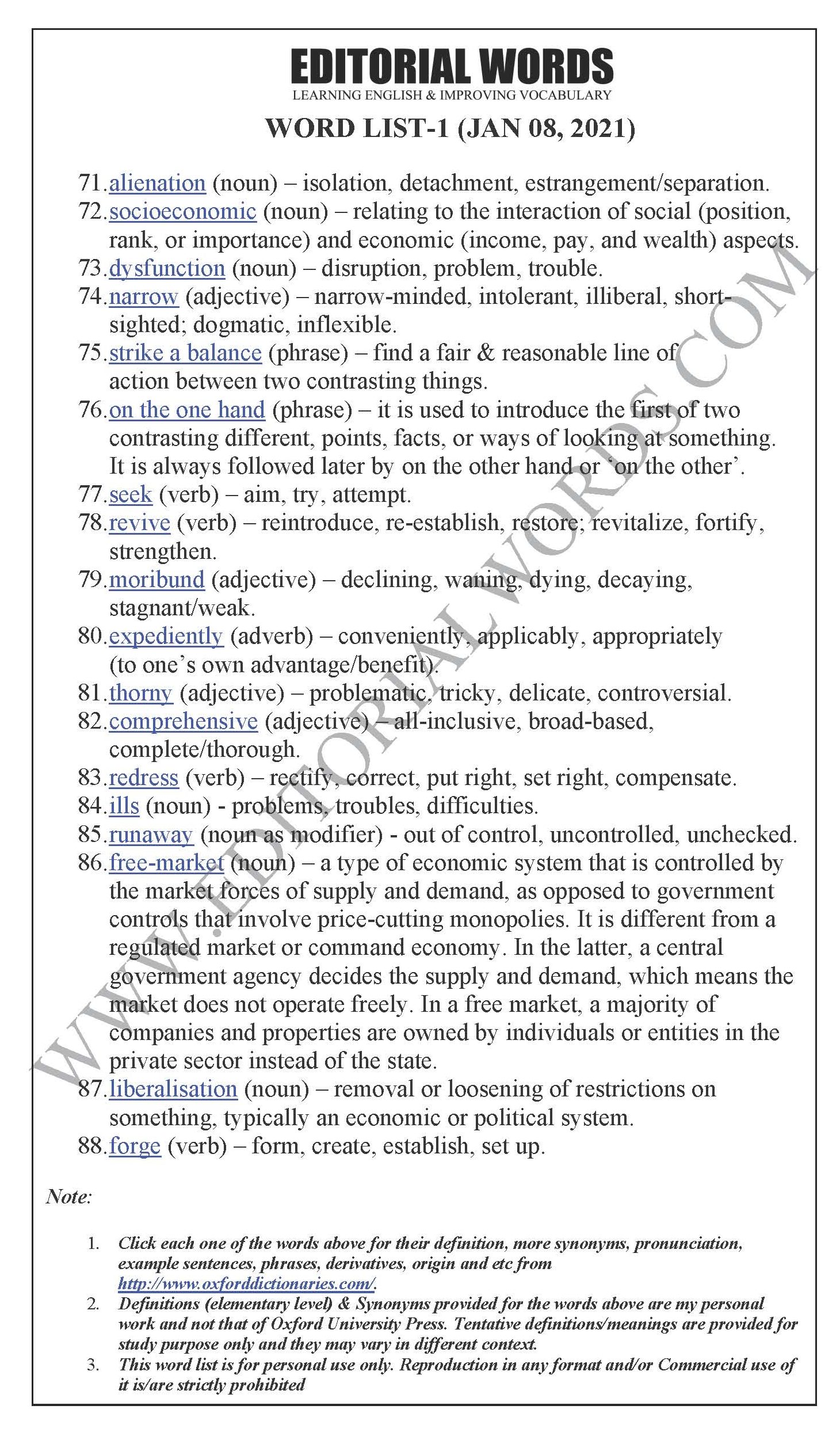The Hindu Editorial (Fruits of incitement) – Jan 08, 2021
If the history of nations is replete with ironies, nowhere were they more evident than in the U.S., when the “greatest nation on earth” became…For further reading, visit “The Hindu”. Below is today’s word list-1 for The Hindu Editorial (Fruits of incitement) – Jan 08, 2021.
To read this article, click here.
This preview is provided here with permission.
Courtesy: The Hindu
Today’s word list-1 for The Hindu Editorial (Fruits of incitement) – Jan 08, 2021:
- fruits (noun) – reward, benefit, advantages.
- incitement (noun) – provocation, persuasion, inducement.
- mob (noun) – a large, disorganized, and often violent crowd of people.
- Capitol (noun) – In the United States, the Capitol is a building in Washington in which the US Congress meets.
- Congress (noun) – legislative assembly, parliament; The United States Congress is the bicameral (two chambers) legislature of the federal government of the United States, and consists of two chambers: the House of Representatives and the Senate.
- breach (noun) – violation, contravention, infringement.
- build (verb) – establish, set up, form, create.
- bipartisan (adjective) – involving cooperation between two (opposite & big) political parties.
- consensus (noun) – an idea or opinion that is shared by all the people in a group, agreement, concurrence.
- replete with (adjective) – filled with, well supplied/stocked with, overloaded.
- irony (noun) – paradox, incongruity, peculiarity; contradiction, a strange/funny situation where things are happening the other way around (than expected).
- a hostage to something (phrase) – to be controlled by something that reduces freedom.
- coup (noun) – a sudden and violent regime change, seizure of power, (illegal) takeover of power.
- bear (verb) – spread, tell, disseminate.
- storm (verb) – attack, rush, conduct an offensive on, attempt to capture.
- overwhelm (verb) – overrun, overpower/inundate; overburden, beset.
- cower (verb) – shrink, pull back, drawback, recoil (in fear).
- eventually (adverb) – in the end, in due course, after some time.
- eject (verb) – remove, oust, get rid of, force out.
- go on to (phrasal verb) – continue, proceed (to do something).
- orderly (adverb) – well regulated, systematized, peaceful.
- transition (noun) – change.
- civic (adjective) – public.
- integrity (noun) – unity, cohesion, undividedness, togetherness, solidarity.
- namely (adverb) – specifically.
- incite (verb) – prompt, induce, impel, influence.
- contentious (adjective) – controversial, disputable, debatable, disputed.
- baseless (adjective) – unjustified, unconfirmed, unproven, unreliable, speculative.
- allegation (noun) – charge, accusation, indictment.
- trigger (noun) – cause, reason.
- run-off (noun) – A runoff election is a second, or follow-up election, in which the top two vote-getters run against each other. Runoff elections occur when no candidate meets a certain threshold of votes to be declared the winner.
- necessitate (verb) – make necessary, require, need, demand, call for.
- popular vote (noun) – the popular vote is simply the total votes cast for each candidate across the whole of the United States. The candidate with the most votes across the nation is said to have won the popular vote.
- Senate (noun) – the upper house or chamber in some bicameral legislative systems. (for example in the US, Australia, Canada).
- tantamount to (adjective) – equivalent to, comparable to, amounting to, on a par with.
- have a job on your hands (phrase) – to have a difficult job to do.
- inauguration (noun) – the formal admission of someone to the office; introduction, formation, beginning (of something).
- understatement (noun) – trivialization, euphemism; restraint, underemphasis.
- sheer (adjective) – utter, complete, total, absolute, outright.
- viciousness (noun) – aggressive/violent behaviour.
- hateful (adjective) – heinous, terrible, horrible, awful, disgusting.
- vitriol (noun) – criticism, rebuke, condemnation, castigation.
- deeply (adverb) – seriously, intensely, strongly, awfully, terribly.
- polarised (adjective) – separated into opposing two.
- brim (verb) – be filled with.
- disenchantment (noun) – disappointment, dissatisfaction, discontent.
- ground reality (noun) – practical condition/situation.
- unprecedented (adjective) – not done or experienced before.
- assault (noun) – attack, offensive, onslaught.
- soul (noun) – embodiment, epitome, quintessence, essence.
- in the making (phrase) – developing, burgeoning, up and coming.
- at the heart of (phrase) – at the most important part of.
- angst (noun) – anxiety, apprehension, distress, disquiet, worry.
- throughout (adverb) – all through, from beginning to end.
- campaign (noun) – an organized effort that seeks to influence the decision making progress within a specific group.
- frustration (noun) – disappointment, annoyance/irritation, dissatisfaction.
- grip (verb) – afflict, affect, beset.
- blue-collar workers (noun) – it describes people who do manual work. Workers who work in a factory, for example, who wear a uniform.
- white-collar workers (noun) – people who work in offices, doing administration or managerial tasks – clerks for example – were referred to as white-collar workers.
- inevitable (adjective) – unavoidable, unpreventable.
- immigration (noun) – the act of leaving one’s countries and moving to another country of which they are not natives, nor citizens, to settle or reside there, especially as permanent residents or naturalized citizens.
- globalisation (noun) – the process of making the trade of goods and services equivalent in all nations (Courtesy: VOA Learning English).
- light the fuse (phrase) – worsen, compound, escalate, aggravate.
- explosive (adjective) – tense, highly charged, critical, serious, dangerous, sensitive.
- prejudice (noun) – discrimination, partiality, intolerance, bigotry.
- insecurity (noun) – uncertainty, lack of protection, vulnerability.
- in reality (phrase) – in fact, actually, really.
- strident (adjective) – in an excessively forceful way; high-pitched, loud & harsh.
- rhetoric (noun) – the art of speaking or writing effectively & persuasively or impressively (but, often lacking substance); bombast, loftiness, hyperbole/extravagant language.
- exploit (verb) – take advantage of, make use of, utilize, misuse.
- alienation (noun) – isolation, detachment, estrangement/separation.
- socioeconomic (noun) – relating to the interaction of social (position, rank, or importance) and economic (income, pay, and wealth) aspects.
- dysfunction (noun) – disruption, problem, trouble.
- narrow (adjective) – narrow-minded, intolerant, illiberal, short-sighted; dogmatic, inflexible.
- strike a balance (phrase) – find a fair & reasonable line of action between two contrasting things.
- on the one hand (phrase) – it is used to introduce the first of two contrasting different, points, facts, or ways of looking at something. It is always followed later by on the other hand or ‘on the other’.
- seek (verb) – aim, try, attempt.
- revive (verb) – reintroduce, re-establish, restore; revitalize, fortify, strengthen.
- moribund (adjective) – declining, waning, dying, decaying, stagnant/weak.
- expediently (adverb) – conveniently, applicably, appropriately (to one’s own advantage/benefit).
- thorny (adjective) – problematic, tricky, delicate, controversial.
- comprehensive (adjective) – all-inclusive, broad-based, complete/thorough.
- redress (verb) – rectify, correct, put right, set right, compensate.
- ills (noun) – problems, troubles, difficulties.
- runaway (noun as modifier) – out of control, uncontrolled, unchecked.
- free-market (noun) – a type of economic system that is controlled by the market forces of supply and demand, as opposed to government controls that involve price-cutting monopolies. It is different from a regulated market or command economy. In the latter, a central government agency decides the supply and demand, which means the market does not operate freely. In a free market, a majority of companies and properties are owned by individuals or entities in the private sector instead of the state.
- liberalisation (noun) – removal or loosening of restrictions on something, typically an economic or political system.
- forge (verb) – form, create, establish, set up.
Note:
1. Click each one of the words above for their definition, more synonyms, pronunciation, example sentences, phrases, derivatives, origin and etc from http://www.oxforddictionaries.com/.
2. Definitions (elementary level) & Synonyms provided for the words above are my personal work and not that of Oxford University Press. Tentative definitions/meanings are provided for study purpose only and they may vary in different context.
3. This word list is for personal use only. Reproduction in any format and/or Commercial use of it is/are strictly prohibited.
Today’s word list-1 The Hindu Editorial (Fruits of incitement) – Jan 08, 2021:




“Phrasal Verbs” We Learnt Last Week
“Idioms & Phrases” We Learnt Last Week
“Important Definitions” We Learnt Last Week
Recent Word Lists For The Hindu Editorial Articles

Be the first to comment